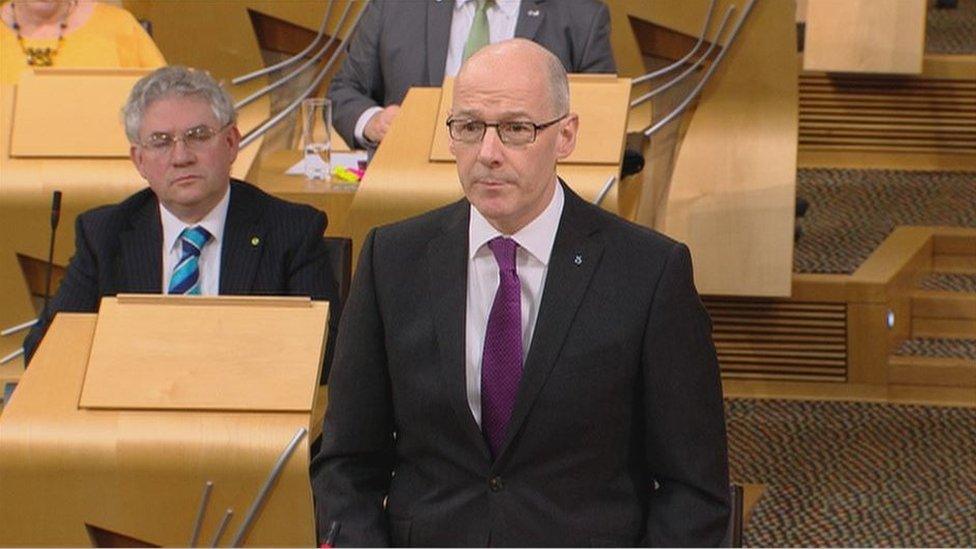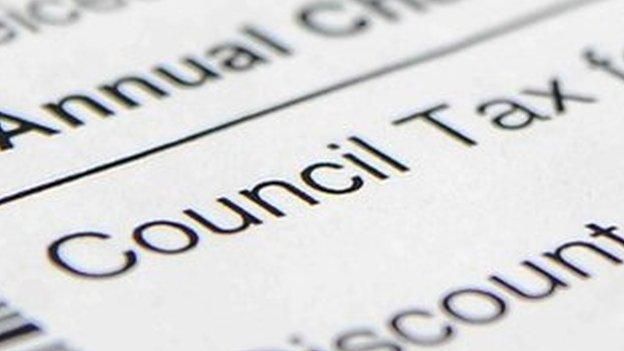Caution: MSPs at work on your tax bill
- Published

Mr Swinney opted not to use Holyrood's new powers to increase income tax
Scottish taxpayers will have an 'S' at the start of their tax code, but otherwise won't see much difference in their tax bills and pay slips.
John Swinney has done what he had signalled, and kept the first year of a Scottish Rate of Income Tax at the same level chosen at Westminster.
It was a safe centrepiece to a cautious, pre-election draft budget, signalling priority areas for the SNP re-election campaign - housing and childcare to the fore, with innovation and digital investment for the economy.
The allocation put in place defensive measures to fend off opposition attacks on the Scottish government's performance, notably on policing and college funding.
And it took the safe option of continuing to freeze council tax, for a ninth year, but by so doing, John Swinney increased the strength of case for reform of local taxation.
So no big deal on tax? Well, not quite. The nature of Holyrood politics has started to change fundamentally.
Whereas MSPs have 16 years of experience of distributing a block grant and balancing the books, they have ventured into riskier waters.
Progressive
They now have the powers to alter income tax, and are on course to get much more substantial powers still. And they have to set a rate. Even if there's no change, it's a choice.
The democratic view of this is that it makes MSPs accountable for the money they raise.
One economic view is that they now have to learn how the use of tax powers can have unintended consequences.
Tax changes create incentives to change behaviour. Take, for instance, the new and devolved tax to replace Stamp Duty - the Land and Buildings Transaction Tax.
For its introduction last April, John Swinney did something unusual - he shifted the tax burden from buyers of cheap houses to buyers of expensive ones.
It was a clear choice for a more progressive tax, with 7% of transactions leaving the buyer worse off than under Stamp Duty.
George Osborne followed the new design of transaction levy - though with a less progressive range of rates.

This showed that ideas can be pinched, and that two very similar countries are likely to find they adopt similar approaches to taxation, however much the rhetoric is about divergence.
That was underlined by the decision to increase the transactions tax on 'additional homes' - second homes, holiday homes and buy-to-let properties. George Osborne did it last month. John Swinney did it this month.
But LBTT has introduced a new dimension to life at Holyrood. If budgets are to be balanced, the tax revenue from such taxes can't veer too far off course.
Governments need an understanding of how much any tax or tax change could raise - and if that revenue isn't raised, they need the flexibility to borrow or find other ways of keeping a level playing field.
'Reasonable'
The Scottish Fiscal Commission has been set up, with the official role to provide assessments of the soundness of tax and spend forecasting.
While its report, published at the same time as the draft budget, said Mr Swinney's forecasts are "reasonable", it was less complimentary about the means used to get to them.
It detailed how the Scottish government needs to gain expertise, and data, with which to forecast more accurately.
That is after forecasts for LBTT revenue, in its first seven months, has come in £31m adrift from one set of Scottish government forecasts. There was a failure to judge correctly how much transactions for the most expensive property would be brought forward to avoid the new charge.
The commission said it was "increasingly concerned" about the absence of an understanding of how behaviour change can alter tax revenue, and that a great deal of work had to be done on the effect of the supplementary charge on the property market.
If MSPs are only now figuring out that transactions tax can change behaviour, they are going to have to get more robust, reliable data with which to model the impact of income tax.
Unlike property, taxable income is a lot easier to move to places where it will be taxed less. And given that there is a high reliance on top earners to pay Scotland's income tax - more than 20% of income tax contributed by the top 1% of earners - it is rather important that there is an understanding of what happens if you hit high earners with higher taxes.
Patchy
The other key message from this budget is about public sector reform. We've heard lots about that, going back to pre-SNP days at St Andrew's House. The results have been patchy to disappointing.
John Swinney put fresh impetus into that. Once again, he wants councils to work more closely together and more efficiently. There was a hint that, if they do, the pain of their finance cut could be eased.
He wants more digital access to public services, and smarter procurement.
And he moved the focus on protecting the health service financially, to challenging it to change the way it works.
Such reform, he said, is at least as important as more money. And not reforming will undermine the ability of the NHS to meet rising demand from an ageing population, and rising expectations of what health technology can provide.
That could put MSPs into new territory of confronting the power of the public sector professions and of other vested interests.
It is another signal that governing is about a lot more than distributing cash and giving away free stuff.
- Published14 December 2015
